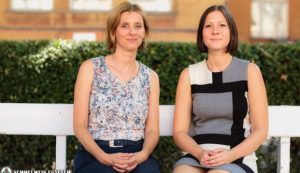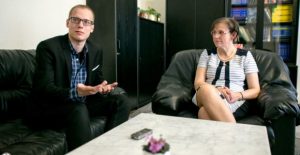The research conducted by Dr. Péter Stiedl, Department of Periodontology, focuses on the genetic background of periodontal inflammations. His mentor is Dr. Gábor Varga, Head of the Department of Oral Biology. They started to work together in 2008, first in the framework of the Students’ Scientific Association (TDK) work, then in the framework of the Kerpel-Fronius Talent Support Programme.
 As Dr. Péter Stiedl said, he got in contact with Dr. Gábor Varga at third year, while he was looking for a TDK research topic. He also added that originally he was dealing with cell cultures and researches related to cell physiology, then he participated in the genetic research initiated in cooperation with the Department of Periodontology.
As Dr. Péter Stiedl said, he got in contact with Dr. Gábor Varga at third year, while he was looking for a TDK research topic. He also added that originally he was dealing with cell cultures and researches related to cell physiology, then he participated in the genetic research initiated in cooperation with the Department of Periodontology.
“The Department of Oral Biology is the only theoretical and experimental department of the Faculty of Dentistry, therefore we intend to give priority to those research areas, which might be important and useful to the clinical practice as well. This is how some experiments were started approximately 10 years ago, which were on the one hand stem cell research, and on the other hand they focused on the complex genetic background of certain dental diseases.”, said Dr. Gábor Varga.
The professor recalled that Dr. Péter Stiedl, together with some other TDK students joined the genomic program, of which the main focus was the examination of the gene polymorphism that presumably plays a role in the development of periodontal inflammations. As he said, Dr. Stiedl started to work for the PhD degree on the basis of the successful research and he is still in cooperation with the Department of Oral Biology, meanwhile he currently works at the Department of Periodontology.
 As Dr. Gábor Varga highlighted, above the age of 60, more people have periodontal inflammations than having an entirely intact parodontium, in which both the genetic background can play a major role, as well as for example the quality of dental hygiene. This is a multifactorial disease, therefore it is important to know what types of diseases the patient currently has or had, which can have an effect on the state of the immune system and the quality of reactions to the bacterial infection. He also emphasized that with the research of the structure, the functions and the changes of genes, a missing element can be detected in the pathomechanism of the development of inflammatory periodontal diseases. This could become the basis for more efficient health care strategies and the elaboration of individualized medicine.
As Dr. Gábor Varga highlighted, above the age of 60, more people have periodontal inflammations than having an entirely intact parodontium, in which both the genetic background can play a major role, as well as for example the quality of dental hygiene. This is a multifactorial disease, therefore it is important to know what types of diseases the patient currently has or had, which can have an effect on the state of the immune system and the quality of reactions to the bacterial infection. He also emphasized that with the research of the structure, the functions and the changes of genes, a missing element can be detected in the pathomechanism of the development of inflammatory periodontal diseases. This could become the basis for more efficient health care strategies and the elaboration of individualized medicine.
According to Dr. Varga, the protein product of several hundred genes take part in periodontal inflammations. Ten years ago researchers thought that by this time as of today, an enormous development will have occurred in the identification of these. However, as the professor said, genomic science moves a lot slower than researchers had previously thought. As he elaborated about the difficulties of the research, it turned out that up until now the researchers have managed to examine 10 genes altogether and they realized years earlier that the more data are available, the more difficult it is to deal with them as every question raises further questions.
“The research was started primarily with a purpose of prevention. In case we manage to discover clear-cut correlations, that provides an opportunity for the clinical professional with the help of appropriate examinations to decide whether the patient should pay more attention for the dental hygiene, even if the symptoms are still moderate (aspecific, reversible damage in the beginning). A determinant factor for this would be a regular dental checkup, which – in an ideal case – could be done by well-trained dental hygiene specialists.”, expressed Dr. Péter Stiedl.
As Dr. Gábor Varga emphasized, with this procedure, the risk could be predicted and not the disease. Since the origin of periodontal inflammations is also geographically determined, that is to say the results differ per nationalities, the examination of the entire Hungarian population would be necessary. According to the professor, in order to reach this, either several thousand items should be examined per group, or the researchers need to grab a piece of information mathematically with which they would be able to step further. The research team chose the second method, and this statistical application can be considered as a novelty in the area of dentistry.
The research was started on two different action threads: one of them focused on the genetic background of missing teeth, the research of which resulted in a publication. The other thread aims at identifying the background of periodontal inflammations, this is currently still in progress. As Dr. Péter Stiedl said, the latest results were introduced at the EuroPerio8 scientific congress in London and soon an international publication will be published about the research as well.
 Dr. Gábor Varga emphasized that this research is very time-consuming, and besides this, Dr. Stiedl has also started to complete his resident studies recently. As the professor highlighted, the fundamental attitude at Semmelweis University is to educate such professionals who understand both basic science and clinical knowledge as well, and they are able to apply both in practice.
Dr. Gábor Varga emphasized that this research is very time-consuming, and besides this, Dr. Stiedl has also started to complete his resident studies recently. As the professor highlighted, the fundamental attitude at Semmelweis University is to educate such professionals who understand both basic science and clinical knowledge as well, and they are able to apply both in practice.
“It is difficult to explain what real success means. Being a mentor is not only about scientific work, it also includes the support that we should provide our students and their entire career with. In this role I do not need to be as strict as a supervisor or a department head.”, said Dr. Gábor Varga, according to whom – as a member of the program council -, the Kerpel talent support program is efficient, because this type of support mentioned above is successfully realized in most of the cases.
According to Dr. Péter Stiedl, his mentor is very supportive of his student’s goals, the professor had always given him the chance to share his research findings with him, even if they were minor but still important for him as a student. As Dr. Stiedl says, he and the professor have been cooperating very well for many years, even if Dr. Stiedl works at the Department of Periodontology, yet they are in frequent contact with each other. Their relationship is not only professional but also personal: they both know a lot about one another’s family and private life.
Eszter Keresztes
Photo: Attila Kovács, Semmelweis University
Translation: Katalin Illés-Romhányi


